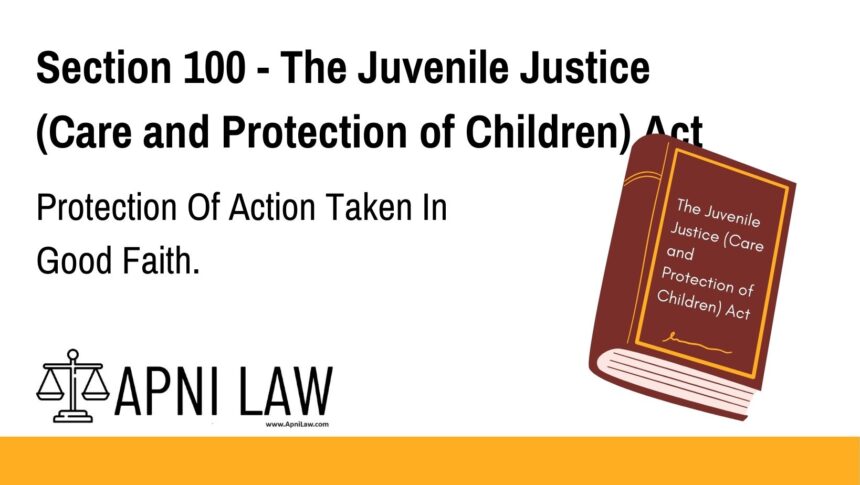Code: Section 100 of the Juvenile Justice (Care and Protection of Children) Act, 2015
No suit, prosecution or other legal proceeding shall lie against the Central Government, or the State Government or any person acting under the directions of the Central Government or State Government, as the case may be, in respect of anything which is done in good faith or intended to be done in pursuance of this Act or of any rules or regulations made thereunder.
—
Explanation of Section 100 JJ Act
Section 100 of the Juvenile Justice Act offers legal protection to individuals or authorities who act in good faith while implementing the provisions of the Act. It covers actions taken by the Central Government, State Government, or anyone working under their direction.
The purpose of this provision is to prevent unnecessary litigation against officials who act with honest intent. If an action is taken sincerely and with the aim of enforcing or executing the Juvenile Justice Act or its related rules, no lawsuit, prosecution, or legal action can be brought against the person or authority involved.
In essence, the section encourages the smooth and fearless execution of juvenile justice laws without the fear of legal consequences, as long as the actions are taken in good faith.
—
Key Features
- Provides immunity to government officials and authorities for actions taken in good faith.
- Applies to both Central and State Government officers and their authorized representatives.
- Covers actions under the Act as well as rules and regulations framed under it.
- Prevents misuse of the legal system to harass officials acting honestly and responsibly.
—
Illustration
Example 1: Officer Enforcing Institutional Transfer
A child is transferred from one Child Care Institution to another under an official order. A social welfare officer executes this task based on government directions. Later, a relative of the child attempts to sue the officer for causing inconvenience. Under Section 100, the officer is protected from legal action because the transfer was carried out in good faith and in line with the law.
Example 2: Committee Member Making a Decision on Foster Care
A Child Welfare Committee places a child in foster care after evaluating all the facts. Although the biological family disagrees with the decision, they cannot initiate legal proceedings against the committee members. The law shields their actions, provided they were made with honest intent and under lawful authority.
—
Common Questions and Answers
- Who is protected under Section 100?
Any person acting under the directions of the Central or State Government is protected. This includes officers, committee members, board members, and other government employees or appointees.
- What does “good faith” mean in this context?
Good faith refers to actions taken with honest intent, without malice, negligence, or dishonesty, and in accordance with the law.
- Does this protection cover private organizations?
No. The protection applies only to government officials or those acting under official government directions under the Act.
- Can someone still be held accountable for wrongful conduct?
Yes. If it is proven that the action was not taken in good faith—meaning it involved bad intent, recklessness, or personal gain—this protection will not apply.
- Why is such a protection clause necessary?
It ensures that public officials can carry out their duties without the constant threat of legal action, which could otherwise delay or discourage effective enforcement of child welfare laws.
—
Conclusion
Section 100 of the Juvenile Justice Act serves as a safeguard for individuals implementing the law in good faith. It enables authorities to take swift and necessary actions for child protection without fear of legal retaliation, provided those actions are sincere and within legal bounds. This legal shield promotes effective enforcement while maintaining accountability.
For more updates and insights on child protection laws, visit ApniLaw.








